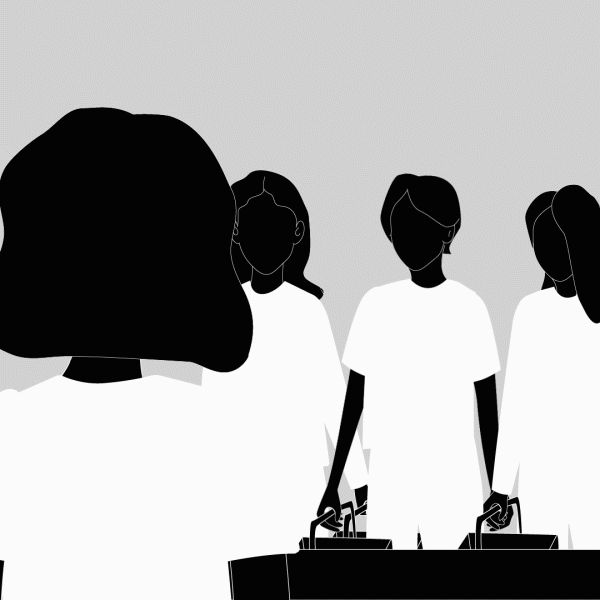THE “HEROES” OF THE PANDEMIC ARE STRUGGLING
Overly long working schedules, physical and mental loads, lack of working contracts and many more issues complete the work experience of people working in supermarkets within the country. Edona’s* experience is only one of the cases that portrays such a sad reality.

Illustration: Argjira Kukaj
The so-called “heroes” of the pandemic — the workers of supermarkets in Kosovo — are left behind throughout everyday of their work. Work without contracts, “super” low salaries, “super” long schedules (especially during the holidays), disagreements with the supermarket’s bosses (who do not even know the work law) and daily buyers (who forget people who work there are human beings), are some of the primary problems each worker mentions, even in a “super” short conversation with them.
At the entrance of the supermarket, where I was to meet Edona* for an interview, I heard the noise of the scanner on the cash register she was working on. I also saw the long line of buyers waiting to pay. I waited until Edona completed the payments of everyone and then I asked her a few questions which she gladly answered, even during her break.
At first, let me tell you a little about Edona.
Edona started working at one of the biggest supermarkets in Deçan three years ago; at first it was supposed to be a temporary job but it turned out to be the opposite. She is one of the most loyal, and most diligent workers this supermarket has. She is always correct at work and is never late.
To Edona, being a salesperson in a supermarket is very tiring, not just physically but also mentally. From the moment she begins her shift, communications with buyers can be very unfitting. She explains how, often, buyers call her terrible words and even accuse her of lying.
“There are buyers who get many products and when they come at the register to pay, they accuse me of stealing from them, saying the price on the shelf is different from the one on the scanner” – tells Edona, while she adds that she always tries to explain to them that this is not her fault and how she cannot even change the prices of the register.
Cases like this occur almost daily, and they often have a big impact on her. In situations like that, Edona tries to find comfort anywhere, even in the corners of the supermarket.
“Sometimes I contemplate going into a corner and cry like a child until the anger passes. There is no other way to get away from situations like these, which cause all of us great stress. We cannot talk back to the buyer” – says Edona in the name of all her colleagues.
While we are speaking about colleagues, one of the most positive things in Edona’s working environment and something that she greatly appreciates is the time spent with them. She says that after all these years of working at the supermarket, she managed to build friendships with each of the colleagues, friendships these that go beyond the doors of the supermarket. Her best moments are spent during her lunch break (the 30 minutes it lasts) where all the work worries are in the background, everything happens in the break room where sharing stories and bonding is never ending.
Time to go back to the supermarket problems.
This 30-minute break is for 8 hours of work, but not necessarily because schedules in this sector are more like relative concepts. They often work 10 hours but the amount of break time does not change. During the holidays – like Aid or New Year’s – schedules are truly long. “We get very tired 2-3 days before the holidays, because the number of buyers increases while the number or employees remains the same. We have to work two shifts, one after the other, from 8 am to 11 at night”.
Taking this into account, normally there should be an increase in salary, or at least bonuses, but at the place where Edona works, they don’t get either. “During summer, almost everybody gets slightly more paid, but no matter how much work we have, we never get any more than 200 euros”.
But it doesn’t end here.
What Edona believes should be mentioned is the problem of contracts, at the end of the day everyone wants that the time they spend working to be counted at work experience. While most businesses sign contracts with their employees, supermarket workers do not have this “luxury”. Edona doesn’t have a work contract and neither do her co-workers. They get their salaries in a white envelope with their name on the back. Which means, as workers of that supermarket, they do not possess the full rights granted by law. Edona shared how she has some health problems during her working hours, she was allowed to get medical help and then return to work.
“During the first year of work, we are not allowed to have time off”, Edona continues sharing. Only after we work for a year, we are given one week off per year. Without assuming, but by assessing what we see, these workers have to truly deserve their break before asking for it.
The worst thing regarding their problems is that they have nowhere to address them. For those brave enough to complain to their superiors, their complaints are not heard. They don’t even have a union that would help them. I said those who are “brave” because most workers remain silent because of the fear of getting fired. In today’s economic situation (especially during the pandemic) – where most families live in deep crisis – a salary, even a small one of a supermarket worker cannot be lost. Edona says that problems like these, she has to keep inside, in order to support herself and her family.
And so, after I said goodbye to her and as I was walking away, I kept thinking about the things Edona has to deal with as a supermarket employee. It is too much “super” much.
(The name used is fictional. Because of the risk of losing her job, the interviewed employee did not want to go by her real name)
About the author: Rexhep Kamberaj, 21 years old from Deçan, studies English at the University of Prishtina.
This grant is supported by the Balkan Trust for Democracy, a project of the German Marshall Fund of the United States


